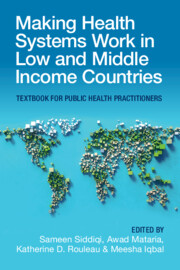 Making Health Systems Work in Low and Middle Income Countries
Making Health Systems Work in Low and Middle Income Countries Book contents
- Making Health Systems Work in Low and Middle Income Countries
- Reviews
- Making Health Systems Work in Low and Middle Income Countries
- Copyright page
- Dedication
- Contents
- About the Editors
- Contributors
- Preface
- Section 1 Analyzing Health Systems: Concepts, Components, Performance
- Chapter 1 Introduction to Health Systems
- Chapter 2 Health Systems Based on Primary Health Care
- Chapter 3 Universal Health Coverage and Health System Strengthening
- Chapter 4 Health System Governance
- Chapter 5 Financing Health Care
- Chapter 6 Health Workforce in Low and Middle Income Countries
- Chapter 7 The Pharmaceutical System and Its Components
- Chapter 8 Health Information Systems
- Chapter 9 The Organization and Management of Health Services
- Chapter 10 Health Services Delivery
- Chapter 11 Role and Contribution of the Community in Health System Strengthening
- Chapter 12 Performing Health Systems
- Chapter 13 Decision-Making Tools for Informed Decisions by Health Policymakers and Managers
- Chapter 14 Health Policy and Systems Research: The Role of Implementation Research
- Section 2 Transforming Health Systems: Confronting Challenges, Seizing Opportunities
- Index
- References
Chapter 7 - The Pharmaceutical System and Its Components
Regulation and Management and Associated Challenges
from Section 1 - Analyzing Health Systems: Concepts, Components, Performance
Published online by Cambridge University Press: 08 December 2022
- Making Health Systems Work in Low and Middle Income Countries
- Reviews
- Making Health Systems Work in Low and Middle Income Countries
- Copyright page
- Dedication
- Contents
- About the Editors
- Contributors
- Preface
- Section 1 Analyzing Health Systems: Concepts, Components, Performance
- Chapter 1 Introduction to Health Systems
- Chapter 2 Health Systems Based on Primary Health Care
- Chapter 3 Universal Health Coverage and Health System Strengthening
- Chapter 4 Health System Governance
- Chapter 5 Financing Health Care
- Chapter 6 Health Workforce in Low and Middle Income Countries
- Chapter 7 The Pharmaceutical System and Its Components
- Chapter 8 Health Information Systems
- Chapter 9 The Organization and Management of Health Services
- Chapter 10 Health Services Delivery
- Chapter 11 Role and Contribution of the Community in Health System Strengthening
- Chapter 12 Performing Health Systems
- Chapter 13 Decision-Making Tools for Informed Decisions by Health Policymakers and Managers
- Chapter 14 Health Policy and Systems Research: The Role of Implementation Research
- Section 2 Transforming Health Systems: Confronting Challenges, Seizing Opportunities
- Index
- References
Summary
Equitable access to health products is a key condition and an indicator for countries’ progress towards Universal Health Coverage (UHC). Access to healthcare, including essential medicines, is a fundamental human right. Realization of this right involves various combinations of public and private financing and service provision arrangements. The pharmaceutical system is an integral subset of the health system which requires mature regulatory structures and robust supply systems to ensure that health goals are achieved and support country efforts to effectively advance UHC. The landscape of pharmaceutical systems is rapidly changing with increasingly complex technologies, often without clear regulatory approaches or mechanisms to achieve equitable access, especially in low and middle-income countries (L&MICs). Medicines are life-enhancing and lifesaving commodities. For a health system to achieve public health goals, medicines should be available in sufficient quantities and be affordable to the population. Health products must also be safe, quality assured, efficacious and used appropriately to achieve desired health outcomes.
Keywords
- Type
- Chapter
- Information
- Making Health Systems Work in Low and Middle Income CountriesTextbook for Public Health Practitioners, pp. 102 - 117Publisher: Cambridge University PressPrint publication year: 2022
